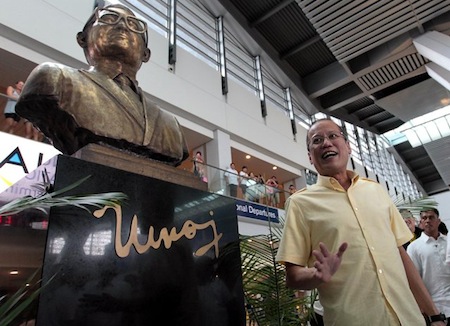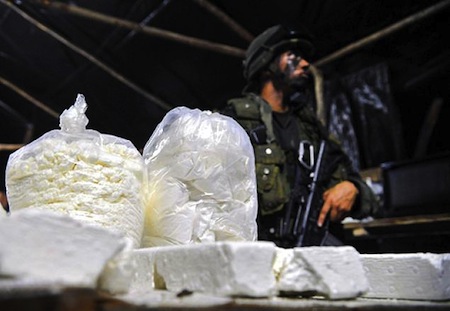When he won election as president of the Philippines in the May 2010 election, Benigno Aquino III — affectionately known as NoyNoy Aquino or simply ‘PNoy’ (it helps that ‘Pinoy’ is an informal term for the Filipino people) — did so largely on a wave of sympathy for his mother, Corazon Aquino, who had died nine months earlier.![]()
Corazon Aquino, the first president of the Philippines following the end of the 21-year reign of Ferdinand Marcos, was the widow of Benigno Aquino, Jr., the chief opponent to Marcos whose assassination in 1983 upon his return to the Philippines led, in part, to the ‘People Power’ revolution that toppled Marcos in 1986.
But sympathy has not fueled 7.6% GDP growth in 2010, 3.9% growth in 2011, and 6.6% growth in 2012, and Aquino (pictured above) and his administration, especially finance minister Cesar Purisima, deserves credit for stories like this, which herald the coming of a new Philippine economic boom:
With $70 billion in reserves and lower interest payments on its debt after recent credit rating upgrades, the Philippines pledged $1 billion to the International Monetary Fund to help shore up the struggling economies of Europe.
That’s the kind of Schadenfreude that the Philippines has come to enjoy in recent years — the country that received its own IMF package in the 1980s and struggled to restart its economy after the 1997 Asian currency crisis is now once again at the crest of another era of prosperity.
Fitch last week became the first of the three major credit ratings agencies to upgrade the Philippines to investment-grade rank, and the Philippine economy shows little signs of slowing (though the fact that nearly 15% of Philippine exports go to China might be cause for concern).
Since the return of democracy to the Philippines in 1986, and despite a narrow boom that the 1997 crisis promptly transformed into busy, corruption and graft have been rampant problems in the country of nearly 95 million people. But under Aquino, even that seems less an inevitability than an opportunity for reform:
Since campaigning on the slogan kung walang kurap, walang mahirap (if there’s no corruption, there will be no poverty), the administration has made a concerted effort over the past two years to strengthen transparency in budgeting processes, ensure competitive bidding in procurement, and reduce influence peddling within government agencies. The Department of Budget Management has strived to increase transparency by reducing lump sums in the budget, making the executive drafts of the national budget available to the public in spreadsheets, insisting on competitive bidding for projects, and avoiding unsolicited project proposals. Along with a more open procurement process, increased trust in government has enhanced the perception of secure property rights which has encouraged investment.
Still, corruption-fighting can also look like grudge-settling. Last year, Aquino succeeded in removing the chief justice of the supreme court, Renato Corona, who had been convicted for failing to declare $4.2 million in income, and he followed up in November 2012 with the arrest of his predecessor, Gloria Macapagal-Arroyo, president from 2001 to 2010, on charges of corruption, misuse of funds and rigging the 2007 parliamentary elections — a ballsy move that may yet backfire.
Even beyond the joyous economic tidings, the Philippines — with its own tragic role as an early theater of U.S. 20th century nation-building — now finds itself with stronger ties than ever with the United States, given its newfound geopolitical and strategic centrality with the growing U.S. military presence in the Asia-Pacific region and U.S. president Barack Obama’s much-heralded ‘pivot to Asia.’
It’s safe to say that the Philippines, long the sick man of the Pacific, has its mojo back.
So with midterm elections approaching on May 13 — Philippine voters will choose 12 of the 24 members of its upper house, the Senate, and all of the members of its lower house, the House of Representatives — you’d think that PNoy would be well on his way to a landslide — last month, a Pulse Asia poll showed that he had a 68% approval rating to just 6% disapproval.
Continue reading Midterm Filipino elections a referendum on Aquino administration

